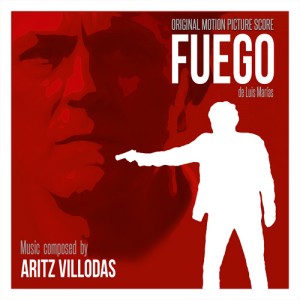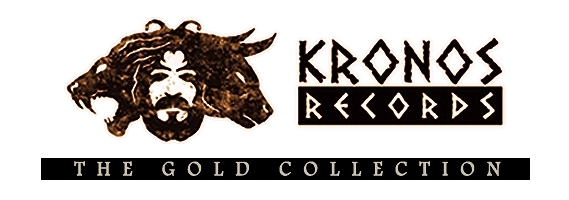Interview: Godwin Borg
TAMBIÉN PUEDES LEER ESTA ENTREVISTA EN ESPAÑOL!
I first met Godwin Borg in Úbeda in the summer of 2006, just minutes before he experienced one of his most cherished memories: shaking hands and chatting with his idol Basil Poledouris. We met on and off during the following years. He was this bearded, imposing guy with a great sense of humor, always direct to the point and with an inclination to make impersonations of movie characters, an ability nurtured with years of practice.
We spent lots of time together in 2013, during the second film music festival in Córdoba, and I was able to know the human being behind the characters. An ongoing journey we’ve kept running along time through Facebook and e-mail. In fact, that’s the way we handled, in the course of several weeks, the interview you’re about to read. Enjoy!
Óscar Salazar
 Godwin Borg was born in Malta in 1973. He has been active in various roles in music since the late 80s. In 2008 he founded Kronos Records, an independent music label specializing in vintage and contemporary soundtracks. During its almost 10 years of activity, Kronos Records have released over a hundred soundtracks on CD. In 2016 Godwin launched Vulkan Records, which specialize in Metal music.
Godwin Borg was born in Malta in 1973. He has been active in various roles in music since the late 80s. In 2008 he founded Kronos Records, an independent music label specializing in vintage and contemporary soundtracks. During its almost 10 years of activity, Kronos Records have released over a hundred soundtracks on CD. In 2016 Godwin launched Vulkan Records, which specialize in Metal music.
How did your love for film music begin?
It was an early love. My parents used to take my brother and me to the cinema regularly. The fondness for music rubbed on both of us very quickly. From an early age I had very keen ears for the music of the films or cartoons I’d be watching either at the cinema or on TV.
When did you discover that film music was also available on its own?
I grew up in the 70s and 80s in a time when Malta was under a strict political ruling that allowed zero, or close to zero, imports and where luxuries, like music, were exactly that: “luxuries people did not need». So, there were none to be found.
In the late part of the 80s things changed and a couple of vinyl and CDs started popping up in a few shops. Then I knew records were available because film credits said so and I always read film credits. But it wasn’t until the late 80s that I owned my very first CD soundtrack: the Polydor 2CD edition of Star Wars. I hope this answers your question.
For sure it does. And, still, there’s a huge leap from collecting to releasing CDs. When did you come with the idea of Kronos Records?
Actually it was a sequence of events which took me to do this. First, the fact there were lots of scores which I thought deserved a release. Something it did not seem to happen. It also was my interest in restoring old recordings. And more. These elements kept colliding in my head.
And, then, at one point, my former job wasn’t renewed. This “exploded” with all the other elements and, thus, Kronos Records was born.
What could you tell our readers about those early days at Kronos?
 The very beginning was surprisingly good. Not even I expected that a brand new, completely unknown label, could manage to get as noticed in the middle of a global financial crisis.
The very beginning was surprisingly good. Not even I expected that a brand new, completely unknown label, could manage to get as noticed in the middle of a global financial crisis.
Be it luck or that I had quite a big network of friends into film music, I don’t know, but the very first title, Contatto Con L’Oriente, Omaggio Al Maestro Akira Ifukube, was very well received. This fact encouraged me to launch a second CD a few months later and, then, another, and another.
At first, the distance between releases was much longer than it is today for various reasons. Mainly because, at the time, I was living in a small apartment in Berlin and storage space was an issue. And not all releases were as well received as the debut. In any case, things settled down with time and nine years later we’re still going steady.
Was it difficult to get that first release into the market?
It was more difficult to move the few releases that followed rather than the first one. As I’ve just mentioned I was also surprised at how well the debut CD did… So definitely no, the first one was not difficult at all to move around.
Which criteria do you follow to decide what is released?
First of all, I have to like it. Second, it would be ideal if also other people like it enough to buy it. But, first and foremost, it hast to captivate me and make me want to own the CD myself.
I started as an aficionado and became a collector decades ago (and still am now), so it has to be a title I’d buy if another label released it. I do receive lots of proposals for releases, most of them really good; but, for various reasons, mainly time and money, I have to pick some and leave out others.
Could you share with us the process you follow from the idea to the finished release? How long does it normally take?
It is never really the same. For the older films it is usually titles that I had long wanted to see released. I obtain material, rights and whatever is needed for the end product and get to work. Sometimes the material sounds good and it is smooth sailing. Other times it is in less than good shape, which of course extends the process. There is no fixed time really.
However, I work on the music first, then the artwork. I love doing both and sometimes I alternate a few hours of music with some others of art and so on. It helps from stagnating doing just one thing. I do love a good challenge though, so working on those tough recordings is really rewarding.
And for recent scores?
In that case, the audio is always (or almost always) in top notch condition, even though an extra listening is always good to spot the occasional glitch or anomaly. Graphic material is also easier to track down and work with, because of its higher definition.
Recent titles take relatively less time to produce. Just as for the older titles, not all projects take the same amount of time and effort.
Now that we speak about old and new titles, why and when did you decide to launch the Gold Series?
As mentioned earlier, one of the main reasons for starting Kronos Records was to release titles that no other label seemed to care enough about. Maybe it was not their time yet. I have always loved what I believe is good, regardless of its age or era. If it is something I want and can be done, I do it.
In any case I thought that certain titles belonged to a special category. Not to take away from any others, by all means, but I guess the name says it all. These are musical gold, which I dig, clean, refine and put out for those who can appreciate it.
The idea started brooding in my head around five years ago, but it was not until some months later, January 2013, that I released the first two titles: Saladino by Angelo Francesco Lavagnino and Quel Maledetto Ponte Sull’Elba by Michele Lacerenza. Two titles I am very fond of!
Do you normally work with composers?
In some rare cases I had the honor to work with the composers directly. In others, with their heirs. But, mainly, it is the publishers I deal with for this kind of titles.
Does it make any difference working with the composer?
It does in the sense it really feels awesome to work with the artist directly. It is fun, but also offers you a unique insight. Sadly, most of the old composers have now passed away, so it is not something that happens too often.
Yet, working with the family also offers a massive insight, as it is the case with the De Masi titles. Filippo is definitely the biggest living expert on his father’s work, so talking to him is always great.
And with the composers of the “standard” releases? Nic Raine, Christopher Zirngibl, Alexander Cimini… Do they help in the process?
Yes, a lot. You mentioned three of the composers with whom I have had the pleasure to work with, and hopefully will work with again. They make doing this job so much fun and easier. They presented me with material that is musically ready to go.
You have actually mentioned two composers with whom I have further collaborated on a new release. Once you see it, you will know exactly what I am talking about now. But let us hold some suspense, I do not want to spoil any surprises. Kronos never unveil their future releases too early.
You’ve released one CD by Rachel Portman. How did this come to be?
Like all the other scores, really. I enquired with Rachel and her publisher and got the thing rolling. Still Life is a truly great score. But, then again, is there anything Rachel writes that is not simply beautiful and inspiring? The CD sold out pretty much immediately and I am not surprised it did.
Something similar happened in the case of Ripley’s Game?
Ripley’s Game was a completely different story. With the exception of Ripley’s Game and four others, none of our titles had had a release on CD before. In fact, a good bunch of them never had had a release in any other format before…
Sometimes I make an exception and pick up a title that is either aching for a reissue or for a more appropriate presentation. Thus, Ripley’s Game came to be.
And Padre Pio?
Padre Pio is another of these few titles we did which already had a previous CD release. Once before, to be more precise. Just once and it quickly vanished. At this rate, our reissue will also soon be sold out.
The music for this one was pretty much ready to go. What was missing was a new booklet and liner notes, which our stable writer and friend John Mansell of Movie Music International wrote for the occasion.
Music goes where no words can ever go and some composers have an even stronger voice and eloquence. Ennio Morricone is one of these composers. Then, among his scores, there are some that soar higher than others, as it’s the case with this particular title. Padre Pio is definitely one of Morricone‘s finest scores from his more «recent» years. It was a real thrill and treat to work on it.
You’ve also released music from several Spanish composers, such as Carles Cases, Iván Palomares or Aritz Villodas. What’s your relationship with Spanish film music?
 My relationship with Spanish film music? Ok, let’s go back a few years… My first trip to Spain, in 2006. Back then I didn’t know too many Spanish composers. I knew the famous ones, as Antón García Abril, Ángel Illarramendi, Roque Baños and José Nieto; but the talent I got to know and discover there with each and every visit was, and still is, overwhelming.
My relationship with Spanish film music? Ok, let’s go back a few years… My first trip to Spain, in 2006. Back then I didn’t know too many Spanish composers. I knew the famous ones, as Antón García Abril, Ángel Illarramendi, Roque Baños and José Nieto; but the talent I got to know and discover there with each and every visit was, and still is, overwhelming.
Spain is for me definitely THE land of up and coming true talents of film music. There are gifted composers from all around the world, but I’ve never met as many talented composers all in one place like in Spain. And I mean real talent, genuine tunesmiths and true masters of their craft. I’ve had the pleasure to work with some of them, like the genial Carles Cases, the amazing Antonio García and the newest breed, like Iván Palomares, Aritz Villodas, Sergio Peña, Sergio Jiménez Lacima and some others with whom I haven’t had the opportunity to do so yet; but you guys hang on in there, your turn will come as well.
If there’s something that genuinely strikes me even more than Spanish warmth and friendliness, it’s the quality of the music Spain produces. Simply astounding!!! And, just when you thought it was over, you’re in for another treat! So, yes, a very happy relationship indeed.
How is it that you came to release the CD Omaggio a Donaggio?
I do like I do with everyone else. Composers are every day Joe’s, like me and you, who write about music for a living (or passion). Since I tend to treat others the way I want to be treated, I end up having many friends. Some of them are composers, others are bricklayers and so on and so forth.
Once I was having a conversation with Pino Donaggio and one thing led to another. A few days later, I hear from him again and he tells me about this young Italian pianist, Isabella Turso, who had been working on her own tribute to him. The CD is not cover versions, but piano reinterpretations of various pieces by Donaggio, spanning through his career. He got me in touch with Isabella and together we worked in this beautiful release.
Just recently you’ve just launched a new label, devoted to another of your musical passions: Metal. Are there many differences versus releasing soundtracks?
Not really. The principles and procedures are pretty much the same and the trigger is also the same. It has to be a band I like first and foremost. Then, see if it is doable and, if it is, we proceed with the CD. Sometimes it is plain sailing, sometimes a bit less plain, just like with soundtracks. Music is really the universal language that unites people of completely different backgrounds under one roof or space.
Any other surprises in the making for the next months?
Oh, yes! That always. I am currently working on a good bunch of titles that will see the light of day in the coming months. I also have just announced the last two titles for now: Salvatore, Questa È La Vita by Paolo Vivaldi and Queen’s Messenger by Stelvio Cipriani.
Keep on the watch for news and announcements on www.kronosrecords.com and our Facebook page!





